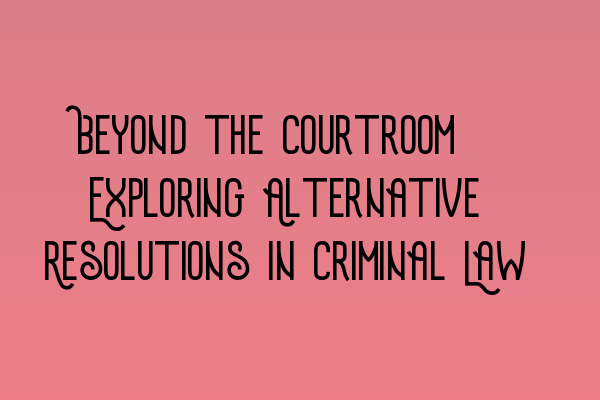Beyond the Courtroom: Exploring Alternative Resolutions in Criminal Law
As criminal law solicitors, our primary focus is ensuring that our clients receive the best possible outcome in the courtroom. However, there are situations where pursuing alternative resolutions can be equally beneficial. In this article, we will delve into the various alternative dispute resolution methods available in criminal law and discuss their advantages.
1. Mediation
Mediation involves bringing both parties together to discuss their issues in the presence of a neutral third party. This method encourages open communication and allows for the exploration of mutually agreeable solutions. Mediation can be a highly effective way to resolve disputes in criminal law, especially in cases where the relationship between the defendant and the victim needs to be salvaged or repaired.
For instance, in cases of assault, mediation can provide an opportunity for the defendant to understand the impact of their actions on the victim and express genuine remorse. It allows both parties to engage in a constructive dialogue and work towards a resolution that benefits everyone involved.
If you’re interested in learning more about the process of mediation in criminal law, check out our related article: SQE 1 Practice Mocks FLK1 FLK2.
2. Restorative Justice
Restorative justice aims to repair the harm caused by a crime by bringing together the offender, the victim, and other affected parties. It emphasizes communication, healing, and transformation, rather than solely focusing on punishment.
Through facilitated dialogues, victims have the opportunity to express their feelings and the impact of the crime on their lives, while offenders can take responsibility for their actions and understand the consequences. Restorative justice allows for the development of empathy, accountability, and a sense of closure for all parties involved.
If you’re interested in exploring the concept of restorative justice further, we recommend reading our related article: SQE 2 Preparation Courses.
3. Plea Bargaining
In certain cases, where the evidence is strong and the potential consequences of going to trial are significant, plea bargaining can be a viable option. This involves negotiating with the prosecution to secure a lesser charge or a reduced sentence in exchange for a guilty plea.
Plea bargaining can save time and resources for both the court and the defendant. It allows for more certainty in the outcome and can often lead to more lenient sentences compared to the potential consequences of a full trial.
For an in-depth look at the practice of plea bargaining, take a look at our related article: SRA SQE Exam Dates.
4. Diversion Programs
Diversion programs offer an alternative to the traditional criminal justice process for certain offenders, typically those who are non-violent and are first-time offenders. These programs aim to address the underlying issues that may have contributed to the criminal behavior, such as drug addiction or mental health problems.
By participating in diversion programs, offenders can potentially avoid a criminal record and receive the necessary support and treatment to reintegrate into society. These programs focus on rehabilitation rather than punishment, offering individuals a second chance at a productive life.
To explore the different diversion programs available in criminal law, click here: SQE 1 Preparation Courses.
Conclusion
While the courtroom remains the primary arena for resolving criminal cases, it is important to recognize that alternative dispute resolution methods can provide innovative and effective solutions. Mediation, restorative justice, plea bargaining, and diversion programs offer opportunities for healing, rehabilitation, and reduced harm to all parties involved.
At SQE Criminal Law & Practice Law UK, we understand the importance of exploring all available options in criminal law. If you require legal assistance or have any questions, please SQE 1 Practice Exam Questions.
